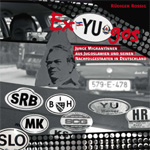Rüdiger Rossig | Journalist | Novinar
European solidarity: Take the money and run
By Ruediger Rossig
It’s a familiar story. In times of plenty you have no wants, you don’t need others’ help – and everyone is your friend. Should you extend a helping hand to others, everyone really is your friend. But who can you really depend on? That’s what you fi nd out when times change for the worse.
Greece, Portugal and other EU member states know all about that by now. But even within states, some regions are more prosperous than others.
The Free State of Bavaria (as it’s offi cially known) is doing well, very well. Its current public relations slogans – formerly “Laptop and Lederhosen”, now “Heart, Heimat, High- tech” captures the essence of Bavaria’s success. Germany’s southernmost state is a felicitous mix of old and new, tradition and research, industry and agriculture. People there are rightly proud of their state, but pride some- times turns into arrogance, and ingratitude.
“Bavaria can go it alone,” is the title of Wilfried Scharnagl’s new book. In it, the 74-year- old former chief editor of the Bayernkurier, the party organ of Bavaria’s conservative CSU party, argues that the Free State should secede from Germany.
Too much money earned in Bavaria is siphoned off by other German states, Scharnagl writes. Similarly, far too much German money made in Bavaria is transferred to needy EU states. That position puts Scharnagl squarely in line with politicians in other prosperous parts of the EU.
In Catalonia, for instance, hundreds of thou- sands demonstrated on Sept. 11 for indepen- dence from Spain. The idea was the same as in Bavaria: that Barcelona’s rich hinterlands are being bled to keep poorer regions in Spain on life support.
In a way they’re right. Thanks to its humming industries, Cata- lonia certainly does pay more into Spain’s coffers than do other regions. Conversely, however, Catalonia has also benefi ted for centuries from the cheap labor and raw materials that other regions of Spain provide.
Also, the Catalan separatists neglect to mention that their region also gets support from Madrid. Owing € 44 billion, Cata- lonia is Spain’s most heavily indebted region and recently requested an emergency € 5.7 billion loan from the central government.
Bavaria might not need loans, but it does have a debt to pay, of sorts. When Germany was fi rst unifi ed in 1871, Bavaria was a backwater. A lack of raw materials and extremely slow population growth obstructed the growth of industry. Farming and handicrafts were the backbone of the economy until after World War II.
Bavaria’s wealth was generated through the support of other parts of Germany, including North Rhine-Westphalia and Hesse, which paid generously to help build up Bavaria’s economy. Mass migration of people and busi- nesses from eastern Germany after World War II, notably the once highly vigorous Berlin region, also contributed.
That these now de-industrialized regions accept help from Bavaria is both historically justifi ed and, in a globalized world, the only option. A community in which those who needed help yesterday have forgotten their obligations is no longer a community.
Wherever “take the money and run” is the guiding principle, there can be no stable society – neither in Spain nor in Germany, Catalonia nor Bavaria … and certainly not in a unified Europe.

 Deutsch
Deutsch  Naški
Naški  English
English 
